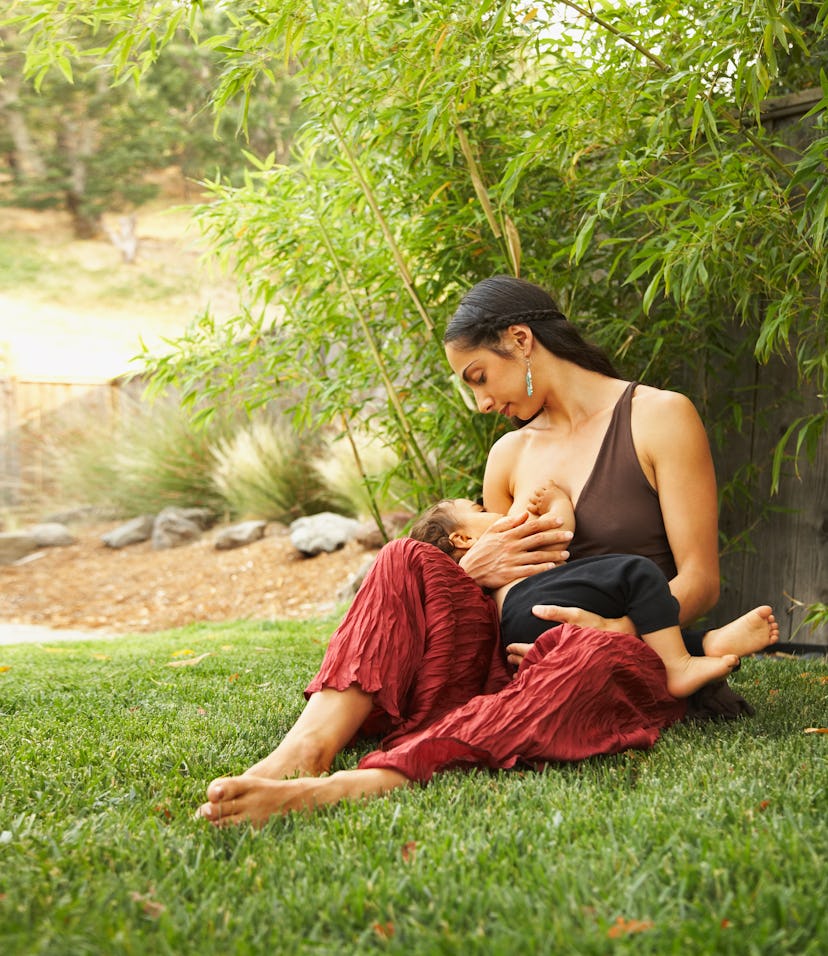Breastfeeding

These Pregnancy Symptoms Can Be Easy To Miss When You're Still Nursing
Breastfeeding is not a reliable longterm birth control method.
For the most part, breastfeeding is going well between you and your baby. She (finally) has a good latch, and things are, well, flowing. So it might come as a surprise when seemingly out of nowhere, you hit a breastfeeding roadblock. Could a potential baby bump be to blame? Yes, you can get pregnant again while breastfeeding. Nursing isn’t a safe form of birth control, and as such, you should be aware of the signs that your body is sending both you and your baby that another sibling is already on the way.
Breastfeeding As Birth Control
Many assume that when you are breastfeeding, getting pregnant is not a possibility, and some might even use nursing as a form of birth control, but you can get pregnant while you’re breastfeeding. “There is definitely some truth to the idea of using breastfeeding as a method of pregnancy spacing,” Dr. Heather Skanes, MD, an OB/GYN in Birmingham, AL tells Romper. “Infant suckling on the nipple alters the hypothalamus production of hormones necessary for ovulation, which means it keeps progesterone levels low.”
But if you’re going to use breastfeeding as birth control, you need to know how to do it. It’s called the Lactational Amenorrhea Method (LAM), and according to the study, “Postpartum Sexuality and the Lactational Amenorrhea Method for Contraception”, it’s a highly effective way of preventing pregnancy. In order for it to be effective, though, three criteria must be met: First, you can’t have had your period since you delivered your baby; you’re exclusively breastfeeding (no 3:00 a.m. bottles); and third, you must be less than six months postpartum. Why? “LAM becomes less effective after six months postpartum,” Dr. Skanes explains. “This is because typically additional nutrition is added to the infant diet around 4-6 months and breastfeeding decreases which leads to return of menses and/or ovulation. But for women who meet these criteria, this method is about 98% effective at preventing pregnancy.” So if you’d like to postpone getting pregnant past six months postpartum, you might need to consider an alternative contraceptive method.
Breastfeeding During Pregnancy
If you think you’ll have to stop nursing once you find that you’re pregnant, think again. It’s totally possible to continue breastfeeding while pregnant,” Dr. Samantha Radford, Ph.D., a chemist with a focus on public health, tells Romper. “You probably couldn't sustain enough supply to keep an exclusively breastfeeding infant fed, but you can certainly continue to nurse a toddler or preschooler!”
The problem is that some pregnancy symptoms are easy to miss when you’re nursing, or you might attribute them to a pending period. “Of course, breastfeeding moms can have all the usual signs of early pregnancy... queasiness, moodiness, and so forth,” says Dr. Radford. “But there can be other signs specific to breastfeeding.”
Signs of Pregnancy
You’re Producing Less Breast Milk
One of the biggest ways to know that you’re expecting baby number two (or four) is that you’re making less breast milk. “You may have a drop in milk supply, even during early pregnancy,” says Dr. Radford. More often than not, the decrease in milk production is due to hormonal changes, per La Leche League. If you experience this, you might need to speak to your child’s pediatrician or a lactation consultant to ensure that your child is getting the nourishment he needs.
Your Breasts Are Sore
If your nipples suddenly hurt to the touch, don’t blame your breastfeeding babe. It might actually be a pregnancy that’s the cause. “If you have raw, sore nipples, you might be pregnant,” says Dr. Radford. “The problem is that this can also occur with PMS, so it's easy to confuse pregnancy with an approaching period.”
Your Breast Milk Might Change In Taste
While your baby might not notice it right away, the taste of your breast milk will change during pregnancy. “Another possible sign of pregnancy is if your baby is less interested in breastfeeding due to the fact that the milk often changes and some babies don't like the taste,” Andrea Tran, RN, IBCLC , a registered nurse and lactation consultant, tells Romper. If your baby is suddenly squirming when it’s time to nurse, you might want to confirm if you’re pregnant or not.
Or Your Baby Doesn’t Want To Nurse At All
Yet another pregnancy symptom you might experience is a sudden (and strange) aversion to nursing. That’s right, even if breastfeeding is going well, you might become agitated by it or want to stop nursing altogether. “One of the most bothersome signs of pregnancy while breastfeeding is nursing aversion and agitation — a severe irritation or even rage while your child is nursing,” explains Dr. Radford. “Staying well rested and hydrated can at least partially alleviate nursing aversion, but that can be hard with a baby or toddler.” You might want to speak to your doctor about this issue, especially if you want to continue nursing.
Of course you cannot be sure whether or not you’re pregnant until you’ve taken a pregnancy test and have it confirmed with a medical provider, but knowing the signs that you could be pregnant even though you are still breastfeeding can help you prepare for your future and decipher nursing irregularities.
Studies referenced:
Labbok, M., ““Postpartum Sexuality and the Lactational Amenorrhea Method for Contraception” 2015.
Experts and sources:
Dr. Heather Skanes, MD, an ob/gyn in Birmingham, AL
Dr. Samantha Radford, Ph.D Chemist
Andrea Tran, RN, IBCLC , a registered nurse and lactation consultant
This article was originally published on